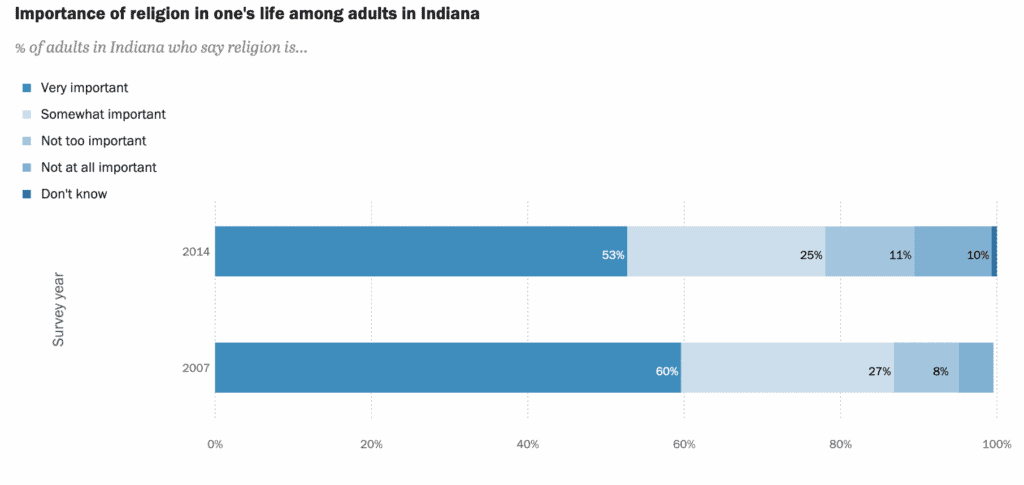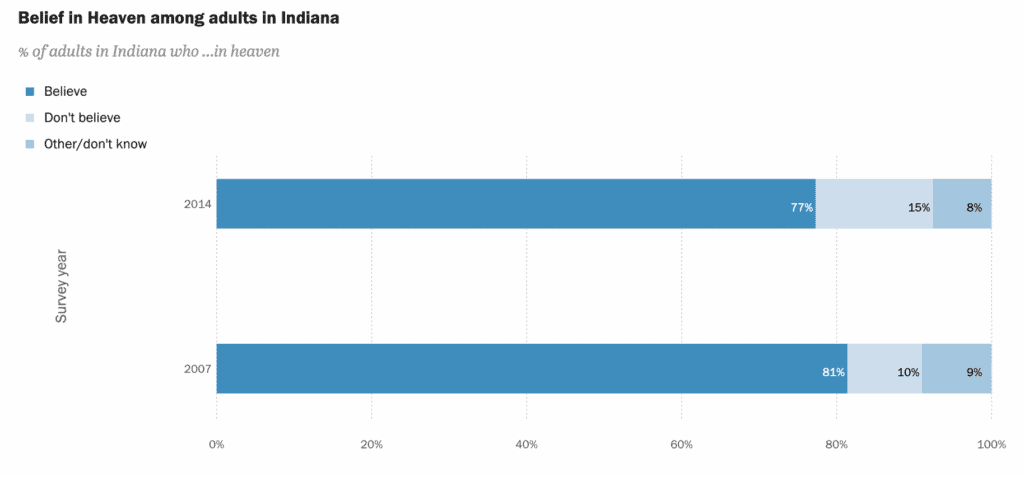Despite a brief stint shortly after my mom died, I’ve never been a church-goer. Much of my time in a Christian church is in my what my grandmother called, “A nice, country church”. Small with a few dozen congregants, a stable leadership of deacons and elders, and the sort of Sunday sermons that proclaim we’re all sinners.
Pew has all sorts of research on church attendance, the importance of religion, and belief in God broken down by state. In Indiana, the trends are stark even looking at relatively old data from 2007-2014:

This question stuck out to me because the decline is clear, but other questions—like a belief in heaven and whether you read scripture regularly—are largely flat:

This tracks nationally, too. In other words, adults would like to think they’re going to heaven but increasingly don’t show up to the presumably necessary places to get there.
Religion and faith fascinates me on a very high level. My lived experiences suggest to me the randomness of luck and pluck have more to do with who lives and who dies and when than God. But I also recognize the routine and structure of showing up on Sundays, looking nice, being involved in the church, going to socials and pitch-ins, and working with the children in the church have immense social value.
For better or worse, people increasingly doubt the idea of an omnipotent god and much of the stories around burning bushes, miracles, parting the Red Sea and so forth (though hedge that Heaven is totally a place). And in so doing, we’ve thrown out all the other ancillary stuff that comes with community, social position, giving, serving, caring for and helping others who are ill, hurt, or at-risk.
Much has been written on this. Many evangelicals think it’s the government’s fault because it started doing so much of the welfare stuff that used to be handled by the church. I suspect it’s more complicated than that, and most churches just couldn’t fill the need adequately.
It’s a shame we have not found a way to achieve the social benefits of the church—which truly fills the soul—with something else minus the biblical and religious parts you have to take on faith. As if faith were the bun and the meat is the friendship in this nourishing little church sandwich.
Some of this is the church’s fault. You can only have so many people clamoring on about how this group or that is terrible before you’ve alienated just about everyone. Churches may be about the most segregated, homogenous places left in America. Outside the mega churches, blacks and whites and other races generally never attend each other’s services. Ethnicities tend to stick together, too. The suburban mega church likely has all the social gratification of contemporary American high school—bland, generic, easy to slip in and slip out unnoticed.
So many people hunger for connectedness and sense of belonging in a place or community. But we increasingly move beyond all the places that used to bring us together, including bars. About the only “tribes” left are politics—with all its ills—and brands. What a tragedy.
We need a new way to bring movement back into our lives.
